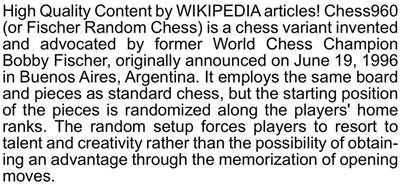I haven't seen any reviews yet of the book 'Chess960' by Jesse Russell and am wondering if you have read it or heard anything about it? Wondering if it is worth purchasing?
Like many queries I receive, it was new to me, so I started to investigate. My first search led to Chess960 [Paperback] Jesse Russell (Editor), Ronald Cohn (Editor) on Amazon.com, with 'Product Details; Paperback: 180 pages; Publisher: Book on Demand Ltd. (April 14, 2012)'. The front cover mentioned 'Bookvika publishing' and 'High Quality Content by Wikipedia articles!'. The back cover mentioned Pubmix.com and carried the following blurb:-

I didn't have to transcribe the text because it was repeated in Amazon's 'Book Description':-
High Quality Content by WIKIPEDIA articles! Chess960 (or Fischer Random Chess) is a chess variant invented and advocated by former World Chess Champion Bobby Fischer, originally announced on June 19, 1996 in Buenos Aires, Argentina. It employs the same board and pieces as standard chess, but the starting position of the pieces is randomized along the players' home ranks. The random setup forces players to resort to talent and creativity rather than the possibility of obtaining an advantage through the memorization of opening moves.
That's all very true, but how much of the book is original and how much is taken from Wikipedia? Clicking on the name of the first 'editor' leads to 'Books › "Jesse Russell"', where we find '"Official Scrabble Players Dictionary" by Jesse Russell and Ronald Cohn (May 14, 2012)' and '"Industry Foundation Classes" by Jesse Russell and Ronald Cohn (Jan 16, 2012)', among many other titles. The first title had a single customer review:-
Silly me, I thought this was supposed to be a Scrabble dictionary, with words that can be used for Scrabble. Instead, it talks about the origins of Scrabble and then gives me a history lesson on Israel and Thailand. I can't understand why it's called a Scrabble Dictionary! I'm starting to wonder if the contents was mistakenly put into this book! Not pleased!
Silly me, indeed. I imagine that the chess960 title also has its 180 pages filled with peripheral info. A Bobby Fischer bio, anyone? Not pleased, indeed!
***

Ziggy, 8 November 2012

1 comment:
Unrelated to today's blog entry about the perhaps "silly" Jesse.R book supposedly about chess960-FRC;....
I have an observation derived from a 1995 Rapid chess960 game between Schwalfenberg - A.Karpov, which S.Gligoric gives on pages 41-42 of his 2002 book titled - "Shall We Play Fischerandom Chess?".
OPENING PRINCIPLE of CHESS960-FRC:
When the chess960-FRC start setup has the queen and a rook on adjacent squares, and the queen starts in the middle half of the board (columns c-f), then....
....then there is an increased chance that an early QxQ exchange will occur.
Here is an illustration in the form of the first few moves of the Karpov game:
(a1-h1) = (NBQRKNBR)
1. c24 c76
2. d24 d75
3. c4:d5 c6:d5
4. Q:c8/Q R:c8/Q
As an aside, after the game Karpov said some positive things about chess960, but Karpov also said a negative thing - namely that....
....that chess960 positions lack "harmonious positions".
I find this statement very doubtful, partly because the moves in the game were all purposeful. The opening strategy by White to simplify by QxQ worked. The middle game saw penetration attempts by Black, where the second attempt worked (20.. h4:g3 21. h2:g3 Rh2+). Black eventually busted White's position by tactical pressure mounted on a pinned white pawn on g3 defended by an immobile rook.
That all sounds plenty harmonious to me, and very normal.
Perhaps Karpov uses the term 'harmonious' to mean....
....Closely matching positions I have studied and internalized in my memory or intuition.
In my book - Play Stronger Chess by Examining Chess960 - I included a quiz that shows lots of unlabled middle game positions, and asks the reader to determine which positions are from chess960 versus traditional chess1.
I believe the task is easy! Therefore,....
....it is not just the opening phase of chess960 that is different from chess1. The beloved middle game is also different. Ultimately the point is that the chess960 middle game positions should be assessed as highly legitimate by any serious chess player who nevertheless finds all non-chess1 start positions to be entirely illegitimate.
The problem that chess1 traditionalists evade is that chess1 has not, does not, and will not bring us experience with these extremely numerous, legitimate, interesting, and harmonious middle game positions that chess960 brings us.
PREDICTION:
In a tournament between grandmasters and mere club level experts, in games where the mere experts survive the opening phase and thus reach the start of the middle game,....
....it would take the grandmasters more moves to achieve victory in chess960 middle games than in the chess1 middle games.
The reason is that the early middle game positions less firmly match the thousands of positions that the grandmasters have internalized. De Groot and others have long claimed that those internalized positions are a major reason that the grandmasters so easily defeat mere experts.
GeneM
CastleLong.com
near Seattle WA USA
2012/Oct/27
Post a Comment